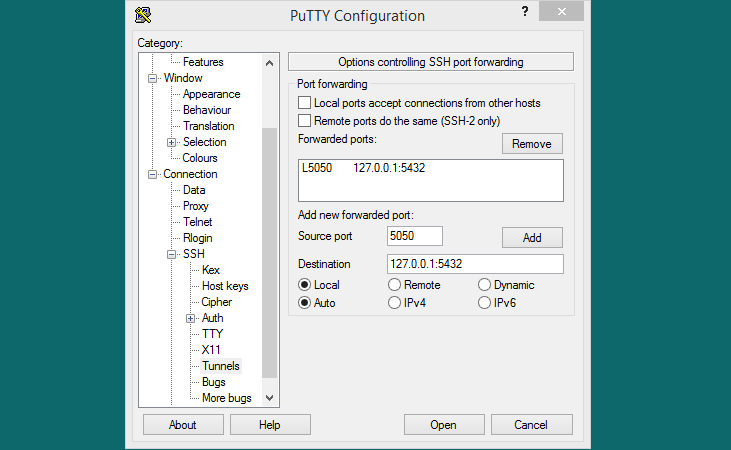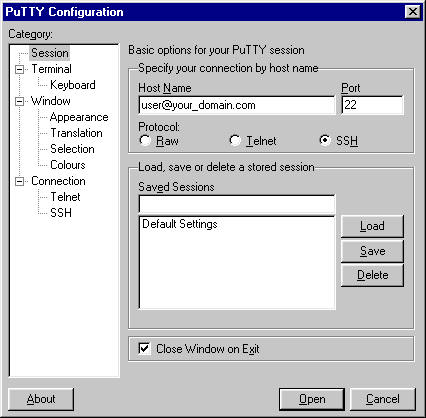
- PUTTY SSH TUTORIAL HOW TO
- PUTTY SSH TUTORIAL INSTALL
- PUTTY SSH TUTORIAL PASSWORD
- PUTTY SSH TUTORIAL DOWNLOAD
- PUTTY SSH TUTORIAL CRACK
While creating an instance, choose the SSH key you’d like to use in the SSH keys section.
PUTTY SSH TUTORIAL PASSWORD
However, if you want, you can also secure your SSH keys using a password so that no one can connect to your instance by stealing your private key Setup SSH keys for PuTTY Step 1: Set up an instance with an SSH key Just connect to your instance using your private key and you are immediately logged in. In addition to bringing more security, using SSH keys makes your life easier: there is no need to type or remember passwords.
PUTTY SSH TUTORIAL CRACK
SSH keys use extremely complex encryption methods that are virtually impossible to crack using brute force methods. During the login process the server verifies if the two keys match and grants access if the private key is correct. SSH key authorization requires two components: a private key used by the client connecting to your instance and a public key stored on your instance.

PUTTY SSH TUTORIAL HOW TO
If you manage a lot of sites, and want to be able to login without having to know or enter the current password, then please read our guide on How to use public/private keys for SSH and SFTP - link opens in a new window.SSH keys offer an even more secure way to log in to your server than a complex password.

In future, to reconnect to the same server again you'll simply need to select your Saved Session, click Load and then Open.Enter your cPanel password, and you are in! Note that as you type the password the cursor will not move, it will just stay a green block - so please take care to enter your password correctly. Once you have connected, you will see the shell login prompt. Once you're happy that you are not being duped click Yes - the fingerprint will be stored on your computer and if it the fingerprint of our server ever changes in future you will receive an alert when connecting. However, if you enjoy a healthy paranoia around security issues, then you can ask us for the server's RSA fingerprints to make sure it matches.

Otherwise at the point you can click the Open button to connect to our server! If all goes well, you should get a fingerprint warning like this: If you have managed to get this far, then it is highly unlikely you are connected to the wrong server. If the details for the new connection you've just created disappear when you clicked save you simply need to select the Saved Session you require, click Load and then Open. Next time you open PuTTY, you will be able to simply double click on your saved session name to reconnect using the same settings. Port: 722 To make it easier next time, you should type a name for this connection profile in the Saved Sessions box, and click the Save button. The example shows a connection to our .uk server. Then, go back to the Session category (as below), and configure the following: Host Name (or IP address): enter your Home Server name, or your domain name - as long as your domain resolves to our IP address then either will work. First we are going to click on the Data category (as below), and enter your cPanel username in the Auto-login username field (krystald in the example). PuTTY will work with your cPanel hosting account without requiring any customisation, but here are the basics - to make life a little easier.

PSFTP - a simple command line SFTP client. The tools include a number of applications, as follows: PuTTYgen - a tool that generates, imports and exports SSH keys.
PUTTY SSH TUTORIAL INSTALL
Install the applications using the default options. It's easiest to grab the Windows installer (32-bit or 64-bit available), which will be named something like.
PUTTY SSH TUTORIAL DOWNLOAD


 0 kommentar(er)
0 kommentar(er)
